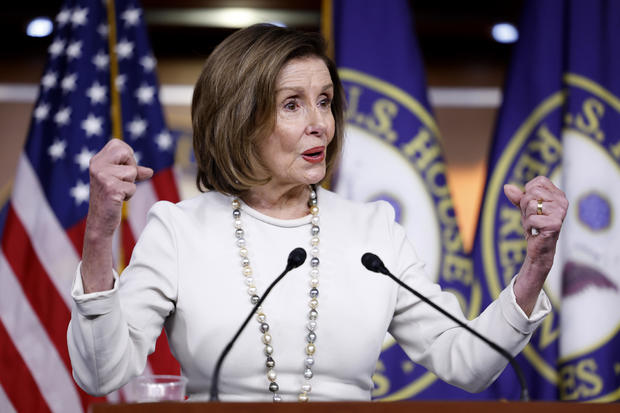With just one month remaining until Republicans take the majority in the U.S. House of Representatives, there are growing calls by Democrats to address the nation’s debt limit, and avert a potential destructive standoff over raising the limit in 2023.
Despite the series of new requests for a vote from veteran House Democrats and newly-elected members of Congress, who’d prefer not deal with a debt ceiling crisis in their first year on Capitol Hill, Congressional leaders have neither scheduled nor planned a vote on the debt ceiling before the end of the year.
Hopes of a debt ceiling proposal are at increasing risk of being dashed amid a crush of must-pass legislation in the fleeting weeks of this Congress.
At a news conference Thursday, House Speaker Nancy Pelosi would not directly answer when asked if the House would pass legislation not address the debt limit before January. She said Democrats have said “again and again” that what they want to handle the debt limit in a “bipartisan way.”
“We think that would be the appropriate way to go,” she added.
Anna Moneymaker / Getty Images
But Pelosi said completion of a spending bill to avert the looming Dec. 16 government shutdown and a bill to authorize U.S. military programs are taking priority in the coming days.
Pelosi said the House will spend Tuesday taking up a Senate-passed bill to strengthen protections for same-sex marriages, but did not specify a date for any debate on the debt ceiling.
A growing number of House Democrats said they would prefer the House proactively move ahead of 2023 on the debt ceiling, to prevent Republicans from leveraging the debt limit to negotiate GOP policy priorities, and potentially trigger a shock to the economy. A standoff over the debt ceiling damaged the U.S. credit rating and financial markets in 2011 during the Obama administration when Republicans controlled the House.
The limit is the maximum amount the United States is allowed to borrow to pay its debts. If the amount of government debt hits that limit, and doesn’t lift the ceiling, the U.S. would be unable to pay what it owes and could default.
“Leading Republicans in the House and Senate keep saying they want to hold the debt ceiling hostage as leverage to demand cuts to Social Security and Medicare, which the president has rightly ruled out,” said Democratic Rep. Don Beyer of Virginia.
Last month, ahead of his designation to be House Democratic leader, Rep. Hakeem Jeffries told reporters, “the leadership of both the House and the Senate, (the debt ceiling) is something we need to take a look at.” Jeffries said Republicans could “hold the economy hostage.”
But in a letter to colleagues last month, House Majority Leader Steny Hoyer (D-MD) listed a series of priorities and plans for the final weeks of the Congress, and did not detail a plan for preemptively raising or addressing the debt limit, before Republicans take control of the House on Jan. 3.
GOP Rep. Chip Roy of Texas on Thursday said addressing the debt ceiling in the lame-duck session is a “non-starter, period.”
“Any legislation on the debt limit has to include real structural reforms that cut spending, balance the budget, and defund federal tyranny against the American people; the only way we can achieve these reforms is with a Republican-controlled House. No Republican in either House should support this Democrat scheme,” Roy said.
Republican Rep. Michael Burgess of Texas said Democrats need to “figure out how we’re concluding” the year.
“I think there’s a lot of stuff that needs to happen, needs to fall into place and we’re running out of daylight to do it,” Burgess said. “So that seems like a pretty big ask to get that done as well.”
And GOP Rep. Dan Bishop of North Carolina slammed Democrats as wanting to “keep spending more money and accumulating more debt until we collapse.”
“I don’t think we’re obligated to help them collapse the American economy,” Bishop said.
They’ve got to figure out how we’re concluding this yearThe office of House Republican leader Kevin McCarthy did not respond to a request for comment.
One incoming House Democrat told CBS News he would prefer the House defuse the issue of the debt ceiling sooner than later.
“We don’t want to play chicken with the economy or the full faith and credit of the United States government,” said Democratic Rep.-elect Glenn Ivey of Maryland. “It has devastating impacts on people’s lives. We’ve seen previous stunts… in previous Congresses. Let’s not put another scare into Wall Street.”
Economic analysts and business leaders have emphasized the significance and volatility of the debt ceiling issue.
A debt ceiling crisis accelerates the chances of a recession,” said Detroit Regional Chamber president Sandy Baruah. “It’s a greatly destabilizing dynamic.”
Ellis Kim contributed to this report.
